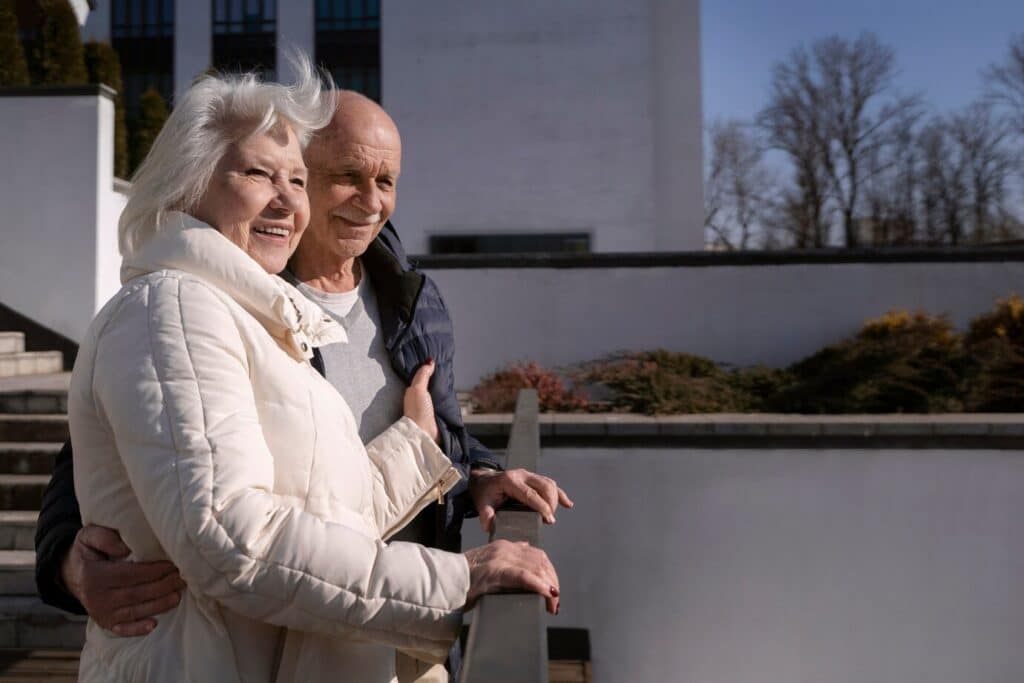Independence is a fundamental aspect of a senior’s life, even when living in an assisted living facility. At Westmont of Brentwood in California, we understand the importance of seniors maintaining their independence while receiving the necessary care and support. This blog post will provide valuable tips for seniors on staying independent and engaged in their daily lives while residing in an assisted living community. By implementing these strategies, seniors can lead a fulfilling and autonomous lifestyle while enjoying the amenities and assistance provided by our facility.
Embracing Independence
For seniors moving into assisted living communities like Westmont of Brentwood in Brentwood, CA, embracing independence is essential to maintaining a sense of self and well-being. Personal strengths can be empowering and help seniors feel more in control of their lives.
Recognizing Personal Strengths
Recognizing personal strengths is an essential step for seniors in assisted living. By acknowledging their abilities and past accomplishments, seniors can boost their confidence and self-esteem. Whether it’s a talent for painting, a knack for storytelling, or a gift for listening, each senior has unique strengths that can be celebrated and leveraged for a sense of fulfillment and purpose.

Personal Strengths
Setting Realistic Goals
To maintain independence in assisted living, seniors should focus on setting realistic goals that align with their abilities and desires. Whether it’s participating in a new activity, improving physical fitness, or maintaining social connections, setting achievable goals can provide a sense of direction and motivation. By breaking down larger goals into smaller, manageable steps, seniors can track their progress and celebrate small victories.
Goals should be specific, measurable, attainable, relevant, and time-bound (SMART) to increase the likelihood of success. With the support of staff and fellow residents at Westmont of Brentwood, seniors can work towards their goals and continue to lead fulfilling lives in their new community.
Creating a Support System
You are not alone in your journey towards maintaining independence in assisted living. Building a solid support system is crucial for seniors to thrive in their new environment. Positive relationships with caregivers can provide emotional support, companionship, and practical assistance.
Building Relationships with Caregivers
Building trust and open communication with caregivers is critical to fostering a supportive environment. Regular interactions and showing appreciation for their assistance can help strengthen these relationships. Don’t hesitate to voice your needs and preferences to ensure that you receive the best care possible.
Staying Connected with Loved Ones
Staying connected with loved ones is crucial for maintaining a sense of belonging and support. Socializing with family and friends can help combat feelings of loneliness and isolation. Consider scheduling regular visits, phone calls, or video chats to stay in touch and share your experiences with those who matter most.
Loved ones play a vital role in providing emotional support and companionship, even when living in an assisted care facility. They can offer encouragement, share memories, and give a sense of continuity and belonging. Remember to consider the power of these connections in enhancing your overall well-being.
Maintaining Physical Health
Physical health is vital for seniors to maintain independence while living in assisted living communities like Westmont of Brentwood, CA. One key aspect of bodily health is staying active and mobile.
Staying Active and Mobile
On top of the range of activities and amenities offered by Westmont of Brentwood, seniors should try to engage in regular physical activity. This could include daily walks around the community, group exercise classes, or gardening. Keeping the body moving helps maintain strength, flexibility, and overall well-being.

Staying Active and Mobile
Managing Chronic Conditions
To effectively maintain physical health, seniors must also focus on managing any chronic conditions they may have. With the support of the staff at Westmont of Brentwood, individuals can work on following their prescribed treatment plans, attending medical appointments regularly, and adopting healthy lifestyle habits to keep their conditions under control.
Conditions such as diabetes, arthritis, or heart disease require careful management to prevent complications and maintain a good quality of life. By staying proactive and taking control of their health, seniors can continue to enjoy their independence and well-being at Westmont of Brentwood.
Nurturing Mental Well-being
After transitioning to assisted living at Westmont of Brentwood, seniors must prioritize their mental well-being to maintain independence and quality of life. Practicing mindfulness and meditation can reduce stress, improve focus, and promote relaxation.
Practicing Mindfulness and Meditation
For seniors living in Brentwood, CA, setting aside time each day for mindfulness exercises or meditation can help clear the mind and enhance self-awareness. Simple deep-breathing exercises or guided meditation sessions can also reduce anxiety and promote a sense of calmness.
Engaging in Hobbies and Interests
With the support and amenities offered at Westmont of Brentwood, seniors can explore new hobbies or reignite past interests to foster mental stimulation and joy. Engaging in activities like painting, gardening, or music can boost creativity, provide a sense of accomplishment, and enhance cognitive function.
Hobbies not only offer a creative outlet but also allow seniors to socialize with peers who share similar interests. Whether it’s joining a book club, participating in a fitness class, or attending art workshops, staying active in hobbies can contribute to a fulfilling and mentally enriching lifestyle in assisted living.
Maintaining Independence In Assisted Living – Tips For Seniors
All seniors have the desire to maintain a sense of independence, even when living in an assisted living facility they need to be more independent. Managing daily tasks is an essential part of this goal.

Maintaining Independence
Creating a Routine and Schedule
One effective way for seniors to maintain independence is by creating a daily routine and schedule. This can help them stay organized and ensure that essential tasks are completed daily. By setting aside specific times for meals, medication, exercise, and social activities, seniors can feel a sense of control over their day.
Simplifying Household Chores
Managing household chores can be overwhelming for seniors. To simplify these tasks, consider incorporating tools and devices that make daily activities easier. For example, using a reacher tool to grab items from high shelves, investing in a lightweight vacuum cleaner, or using organizers for better storage can all help seniors maintain their independence in managing household chores.
Tasks like cleaning, laundry, and meal preparation can also be delegated to professional caregivers or family members to lessen the burden on seniors and ensure that these tasks are completed efficiently.
Staying Engaged and Involved
Many seniors find that staying engaged and involved in community activities is critical to maintaining independence and well-being while residing in assisted living facilities. Participating in events, classes, and social gatherings provides mental stimulation. It helps foster a sense of belonging and connection within the community.
Participating in Community Activities
On the premises of Westmont of Brentwood in Brentwood, CA, seniors can take advantage of a variety of community activities tailored to their interests and abilities. From group exercise classes to cultural outings and social events, there are plenty of opportunities for residents to engage with others and stay active.
Pursuing New Interests and Learning Opportunities
An essential aspect of staying engaged is pursuing new interests and learning opportunities. Whether it’s picking up a new hobby, taking a cooking class, or joining a book club, seniors can expand their horizons and keep their minds sharp. At Westmont of Brentwood, residents have access to a range of programs and activities designed to spark curiosity and encourage lifelong learning.
To further enhance the pursuit of new interests and learning opportunities, seniors can also explore online courses, virtual tours, and educational resources. By embracing continuous learning and staying curious, older adults can stay mentally active and engaged, leading to a more fulfilling and independent lifestyle in assisted living.

Pursuing New Interests
Final Words
Following this advice can help seniors maintain their independence while living in an assisted living facility. It’s essential for seniors to actively participate in decision-making processes regarding their care and daily routines. By advocating for themselves and staying engaged in activities that bring them joy and fulfillment, seniors can continue to lead an independent and fulfilling life.
Recall that it’s vital for seniors living in assisted living facilities to communicate openly with staff members, family, and friends about their needs and preferences. With the proper support and resources, seniors can thrive in their new living environment and enjoy a sense of independence and autonomy. By staying proactive and involved in their care, seniors can make the most of their assisted living experience.
FAQ
Q: Why is maintaining independence important for seniors in assisted living?
A: Maintaining independence in assisted living is crucial for seniors as it helps boost their confidence, self-esteem, and overall sense of well-being. It also promotes a sense of control and autonomy in their daily lives.
Q: What are some tips for seniors to maintain independent in assisted living?
A: Seniors can maintain their independence in assisted living by staying physically active, engaging in social activities, learning new skills or hobbies, and communicating their needs and preferences to the staff.
Q: How can family members support seniors in maintaining independent in assisted living?
A: Family members can support seniors in maintaining independence by encouraging their participation in decision-making, respecting their choices, providing emotional support, and collaborating with the assisted living community to ensure the senior’s needs are met.








